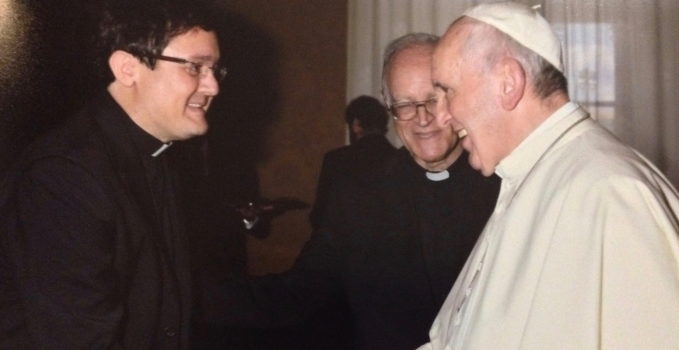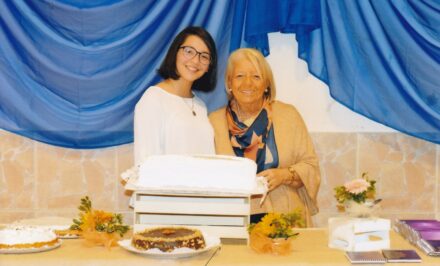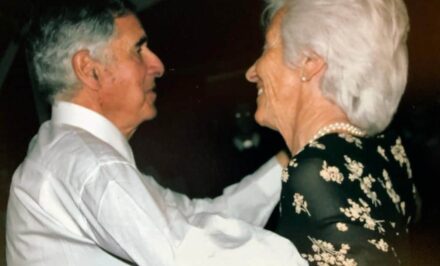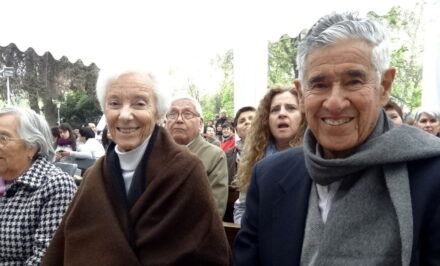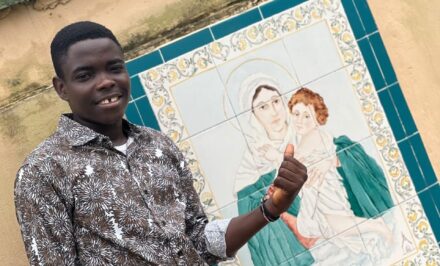Interview of Fr. Alfredo Pereira, Schoenstatt Father from Paraguay •
After working for several years in Italy, exactly in a Roman parish that was entrusted to the Schoenstatt Fathers, and in the university ministry, Fr. Alfredo “Pope” Pereira, Schoenstatt Father from Paraguay, returned to his country in March 2017.
– How was your experience in the “Santi Patroni” Parish of Rome?
I arrived at Santi Patroni Parish in November 2010 as a deacon. During those first months, I learned Italian and grew part of parish life in a gradual and peaceful manner.
The parish was in a situation of re-structuring, sadly due to the fact that a youth and family ministry was practically non-existent.
As a priest, we had to re-set the pastoral situation in the parish and begin to establish the foundation for the parish project with regaining families and young people as the priority.
I recall the time there with great affection, since it has been a part of my priesthood’s first years, especially the work with catechesis, because through it I established the first bonds with parents, children, and families, which undoubtedly, marked those first years. Now they are the youths who have re-founded the youths in the community.
The last three and a half years I had to leave the parish since I had the great opportunity to work with the diocese’s University Ministry.
– Is Rome as “difficult” for Ecclesial Movements as it is said? Why?
I believe it is difficult in the sense that Rome is the base of where to go. Rome is the place where your belonging to the Church and to the Holy Father is quintessentially manifested. This makes it a place of eminent representation and communion. In the first place, it is not a place to found, to expose your ideas or your charism, but instead, it is a place for these ideas to be at the service of the universal Church, and the Church can count on them. It is a place where I invest and place people and resources, not the reverse; I cannot pretend that it is a place where I want to gain people and resources. For this reason, it would be the last place I would choose to found a Movement, and at the same time, the first place where I would establish a base for a Movement that the Church already knows.
– How is Schoenstatt doing in Rome? How is Mission Rome going?
More than anything, Schoenstatt needs to invest more in Rome and in Italy – an investment of people and resources, so it can emerge. Italians are a Marian people, it is Latin and familial, Schoenstatt is made for them. But theories are of no use, it is a country filled with saints, traditions, writings, and culture. The Father and Founder’s genius and our spirituality cannot be presented in books or in conferences, clear cases are needed, only life can enkindle life. There is a small existence round the two Roman Shrines. The foundations are, spirituality and making the Shrines known and appreciated by the Romans, through the charism and pedagogy that it offers. Like the Church’s vision that underlies it foundations. But it needs help, and in this sense project Mission Rome is one of the great gifts that I received and could accompany. Youths leaving one year of their lives, projects, and desires to serve a reality that constantly challenges you is not easy. On one hand, it is all the life that emerges from the Youth Shrine, on the other hand, it is the latent response to the superficiality and ease by which great Movements are tempted and tested.
Thanks to them, the youths in Rome could consolidate and many of the youths learned to leave barriers behind in order to deepen in Schoenstatt’s charism and to lose certain fears. It is a miracle of the continuation of the mission. It is an honor that missionaries leave Paraguay to come to the Heart of the Church to found. It is a contribution that benefits the International Movement, because, as we say, the entire Church is there.
– You had the opportunity to belong to the diocese of the Bishop of Rome, what did you see in Benedict XVI and what do you see in Francis?
In Pope Benedict XVI, I saw an extraordinary figure of humility, clarity and love for the Church. I am a great devotee because he established the foundations of the reform of the curia, he began with unimaginable changes for the moment we were living, and at the same time, he had an admirable humility and coherence. It is easier to read him than to listen to him. But I will never forget the moments with him, the beatification of JP II, the WYD in Madrid beneath the storm, his last discourse in the Wednesday audience, where he bid farewell as Pope.
Francis is a prophet, in the sense that his gestures are very important; his gestures are more meaningful than his words. The prophet embodies his message, and Francis does the same. For this reason, I hope we will all notice that he is a fascinating person on one side, and a difficult one on the other side. Because hidden within his gestures, there is a simpler and more complex message of everything he says and does. In my interpretation, he seeks to break the personal and ecclesial limits that we have, unintentionally, imposed on the Gospel, Jesus’ Good News.
For this reason, in this sense, the reform or that change is not the work of genius, the fact that is genius is that he proposes a way of seeing life and the mission in the foundations of the Church radically rooted in the Gospel. And that is where he confronts us all, because we all have the Pharisee within us, all of us soften the Gospel according to our convenience, according to our interests and that drives this Pope crazy.
– Now that you have returned to your land, do you have a “secret favorite idea” in your heart that you would like to carry out in Paraguay?
Good question, if there were secret ideas, I give them to Mary, because in Rome I learned that the heart speaks of what one has within, and in this sense, it is good to never betray it, but on the other hand, it is just as important to listen to what is in the heart of the people who surround you, because the road of fruitfulness is when both desires meet and walk together. For this reason, I desire first of all to know and to learn about the Movement in order to serve it joyfully, and surely the entire secret will emerge there.
– If miraculously you had the opportunity to meet with Fr. Kentenich for one minute, what would you tell him?
To pray more for more priestly, consecrated, and holy family vocations to come from the Movement in Paraguay. So that everything we do is not just a lot of talk and little action.
Source: Revista Tupãrenda, May 2017
Original: Spanish. 31 May 2017. Translation: Celina M. Garza, San Antonio, TX USA. Edited: Melissa Peña-Janknegt, Elgin, TX USA


